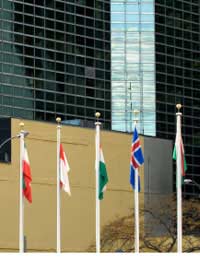Breach of Human Rights

Human rights are universal, or due to everyone regardless of age, race, sex, religion, location, or any other factor. This means that around the world it is agreed that every human being is due the rights to, among other things, life, free speech, freedom of religion/worship, freedom from torture or inhumane treatment, access to education and work, access to an adequate standard of living and housing, access to fair trials and the ability to participate in social, cultural and political activities.
These rights are enshrined in a variety of international treaties which form the basis of international human rights law, but unfortunately breaches of human rights do occur. When this happens, a variety of courts are available to hear the cases and watchdog organisations are able to document and highlight the untoward events.
Human Rights and the Law
Though laws require people to enforce them, the existence of human rights laws mean that if breaches of human right do occur there is a standard by which these breaches maybe judged. The basis of international human rights law is:The Universal Declaration of Human Rights (UDHR) - which was passed unanimously by the United Nations in December 1948. This document was reaffirmed, again unanimously, at the Vienna World Conference on Human Rights in 1993.
United Nations Treaty SystemIn addition to the UDHR, the United Nations also works a treaty system on human rights which includes seven other treaties:
- The Convention on the Elimination of all Forms of Racial Discrimination (1969)
- The International Covenant on Civil and Political Rights (1976)
- The International Covenant on Economic, Social and Cultural Rights (1976)
- The Convention on the Elimination of All Forms of Discrimination Against Women (1981)
- The Convention Against Torture and Other Cruel, Inhuman or Degrading Treatment or Punishment (1987)
- The Convention on the Rights of the Child (1990)
- The International Convention on the Protection of the Rights of All Migrant Workers and Members of Their Families (2003)
In Europe, the European Convention on Human Rights (ECHR) was adopted by the Council of Europe in 1950. Here in the United Kingdom, the Human Rights Act of 1998 was adopted to reinforce the UK’s commitment to human rights and is in force in England, Wales and Northern Ireland. The Scotland Act 1998 guarantees that the Scottish Executive and Scottish Parliament can not do anything contrary to the European Convention on Human Rights.
Human Rights Cases
Those cases which allege that there has been a breach of human rights as guaranteed by international treaty or national law are usually known as “human rights cases”. In countries which have specific human rights legislation, these cases can be taken to the national courts as stipulated in the country’s own laws. In the United Kingdom, for example, the Human Rights Act of 1998 makes it possible for cases concerning human rights to be heard in the UK.The European Court of Human Rights
Larger courts dedicated to only human rights issues also exist. The European Court of Human Rights in Strasbourg, for example, hears cases from countries which ratified the European Convention on Human Rights. The International Criminal Court, which is governed by the Rome Statute signed by 105 countries (including the United Kingdom), also exists as a court of last resort to try those accused of genocide, crimes against humanity and war crimes. The International Criminal Court will not, however, hear cases that are being or have been investigated and/or prosecuted in an individual country unless it is evident that those proceedings were not sincere and genuine.Human Rights Organisations
Unfortunately, treaties, legislation and the courts can not always protect human rights as they should because they can only put in writing what is deemed acceptable and what is not – they need others with the motivation and means to enforce them. Though it is largely up to individual countries to defend the human rights of their own citizens, and sometimes it is the role of international peacekeeping forces to do so in areas of conflict, some organisations have come together observe, document and highlight breaches of human rights around the world.These organisations can not enforce human rights laws, nor can they physically stop breaches of human rights when they do occur, but they can increase public awareness of breaches of human rights and even focus media attention on ongoing situations. Amnesty International is one such organisation which operates in the United Kingdom today. You can find out more about Amnesty International, on their website.


Re: Questionnaire: Experienced Discrimination School?
Good day! I am Reynalyn Joy A. Taylo, currently our research paper for Grade 12 as a HUMSS student.…
Re: Questionnaire: Experienced Discrimination School?
Good day! I am Reynalyn Joy A. Taylo, currently our research paper for Grade 12 as a HUMSS student.…
Re: Questionnaire: Experienced Discrimination School?
Hello, can we use your questionnaire for our research?
Re: High Profile Discrimination Cases
I work for a car rental company. I was sent to a airport to pick a vehicle up to bring back to my job site. I was stopped at…
Re: Questionnaire: Experienced Discrimination School?
Hello! Can we use these survey questions for our project?
Re: Questionnaire: Experienced Discrimination School?
Hello, can we are asking for your permission to use your questionnaire for our research? Thanks!
Re: Questionnaire: Experienced Discrimination School?
We are asking for your permission if we could copy some of your questionnaire for our research ?? Thank…
Re: Questionnaire: Experienced Discrimination School?
hello Good morning my name is Mico john Hernander 17 years old from manila. Im so happy to make comment…
Re: Your Rights in the Workplace
Senior management.. often scream and shout at the team. Things not investigated before the blame game starts. Staff behaviours…
Re: Your Rights in the Workplace
I work at M&S Distribution Centre in the East Midlands and only started working there since the beginning of May 2019, previously…